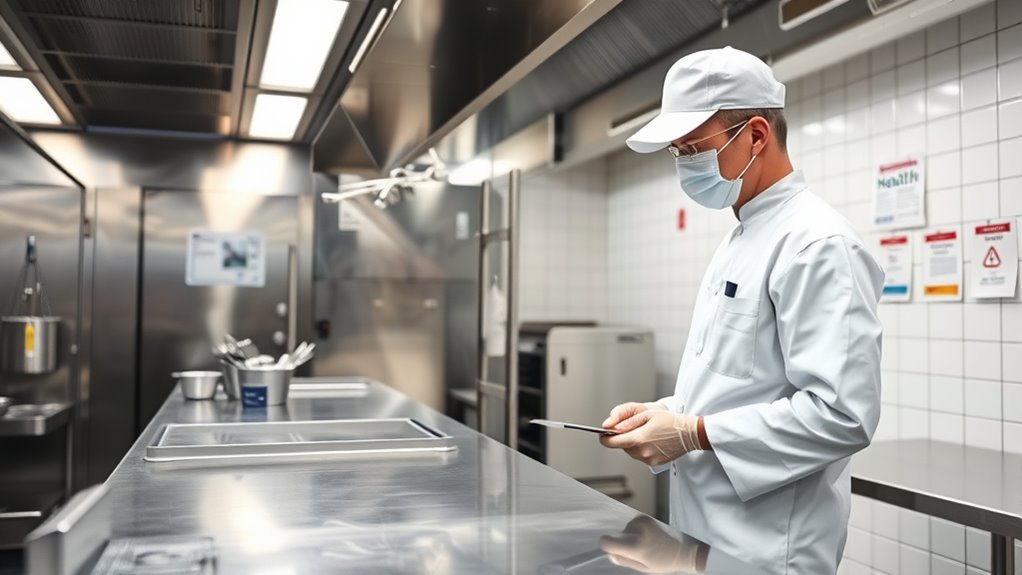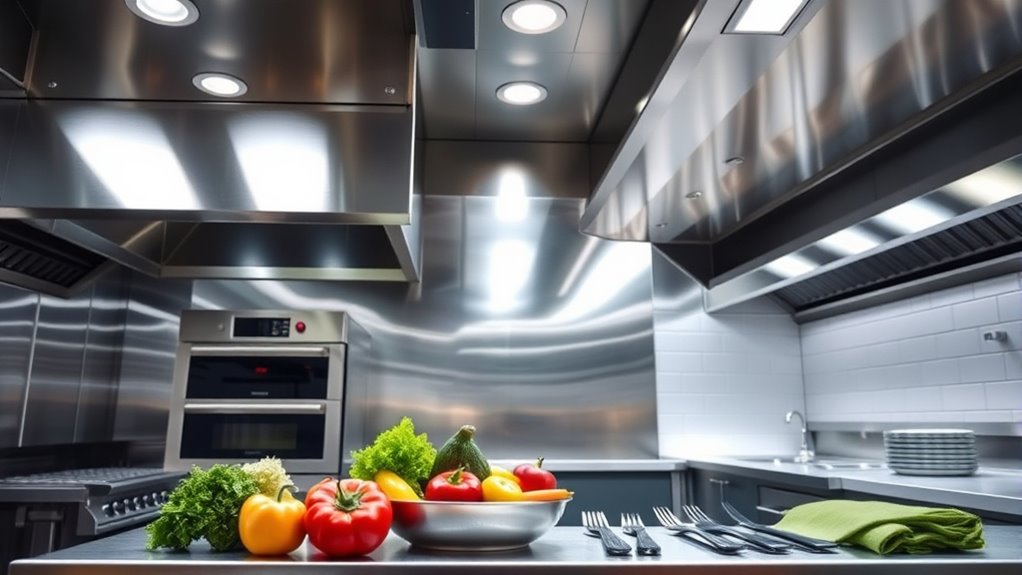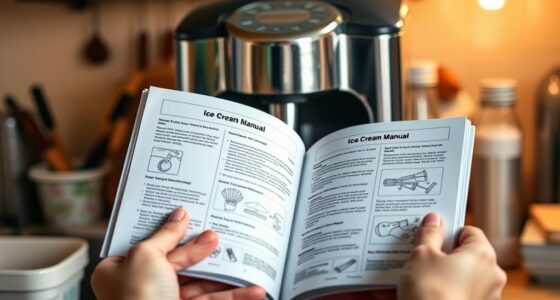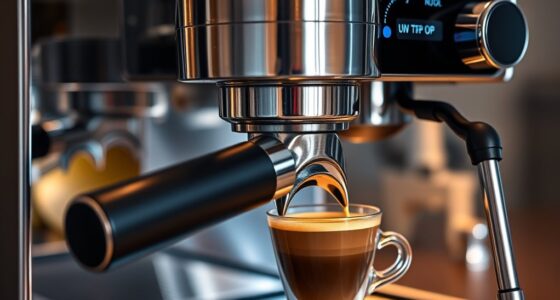To keep your machines inspection-proof before a health check, thoroughly clean and disinfect all equipment using approved agents, emphasizing high-touch surfaces. Make certain your staff follows proper hygiene, washing hands and wearing clean uniforms consistently. Regularly inspect and maintain your tools, document all cleaning routines, and address issues immediately. Staying organized and proactive boosts your chances of passing smoothly. If you want expert tips on staying prepared and confident, explore the strategies shared below.
Key Takeaways
- Conduct a thorough internal cleaning and sanitization of all equipment and surfaces before inspection day.
- Review and update all hygiene and safety documentation, including cleaning logs and training records.
- Ensure staff are trained and remind them of proper handwashing, PPE use, and cleanliness protocols.
- Perform a mock inspection to identify and address any overlooked issues or violations.
- Keep high-touch areas disinfected frequently and maintain organized records to demonstrate compliance.

Are you prepared for the upcoming health inspection? If you want to avoid surprises and guarantee your facility passes with flying colors, it’s vital to focus on the fundamentals—particularly sanitization practices and employee hygiene. These areas are often scrutinized most closely because they directly impact customer safety and satisfaction. Without proper attention, small lapses can quickly turn into violations, so it’s better to stay ahead of the game. Start by reviewing your current procedures and making sure everyone on your team understands their role in maintaining a clean, safe environment.
First, audit your sanitization practices. Are you using the right cleaning agents and techniques for all surfaces and equipment? Regular, thorough cleaning is fundamental, especially in food preparation and service areas. Make sure that all high-touch surfaces—door handles, countertops, utensils—are cleaned and disinfected frequently, following the recommended schedules. It’s also important to keep detailed records of your cleaning routines, as inspectors often ask for proof of consistent sanitation. If your staff isn’t familiar with proper procedures, hold a refresher training session. Clear, consistent communication helps prevent mistakes and ensures everyone understands the importance of their role in maintaining cleanliness. Remember, sanitization isn’t a one-time task; it’s an ongoing process that needs to be integrated into daily operations. Incorporating training on proper cleaning techniques can further reinforce best practices among staff. Additionally, using appropriate cleaning agents ensures that disinfectants are effective against pathogens and meet health standards. Regularly reviewing your sanitization protocols can help identify areas for improvement and ensure compliance with evolving regulations.
Equally important is employee hygiene. Inspectors look closely at how well your staff adheres to personal cleanliness standards. Make sure all employees wash their hands thoroughly with soap and water before handling food, after using the restroom, or touching anything that could contaminate their hands. Provide plenty of handwashing stations stocked with soap, paper towels, and hand sanitizer if appropriate. Enforce policies about wearing clean uniforms, hair restraints, and gloves when necessary. Regularly remind your team about the significance of personal hygiene—not just to pass the inspection but to safeguard your customers’ health. Encourage a culture where staff take pride in their cleanliness and understand that their habits directly influence your reputation. Additionally, staying informed about AI-driven security systems can help monitor compliance and ensure safety standards are consistently met.
Finally, conduct internal inspections before the official visit. Walk through your space as if you’re the inspector, looking for any overlooked areas or potential issues. Address these proactively. Keep all documentation, such as cleaning logs and employee hygiene training records, organized and easily accessible. This preparation shows inspectors that you’re committed to maintaining high standards consistently. By focusing on proper sanitization practices and employee hygiene, you’re not just preparing for an inspection; you’re creating a safer environment that benefits both your staff and your customers. When the day of inspection arrives, you’ll be confident knowing that your facility reflects your dedication to excellence and safety.
Frequently Asked Questions
How Often Should I Schedule Machine Inspections?
You should schedule machine inspections regularly to prevent unexpected breakdowns. Incorporate preventive maintenance into your routine, ideally every few months or as recommended by the manufacturer. Additionally, guarantee your staff is well-trained in operating and maintaining the equipment. Regular inspections, combined with proper preventive maintenance and staff training, help keep your machines in top shape, reducing downtime and ensuring smooth operations at all times.
What Are the Most Common Violations Found During Inspections?
During inspections, you’ll often find violations related to sanitation standards and employee training. These include improper food handling, unclean equipment, and inadequate staff practices. To stay prepared, regularly review sanitation protocols and guarantee your team is well-trained. Keeping your machines clean and staff knowledgeable helps you avoid common violations, making inspections smoother and ensuring compliance. Proactive maintenance and ongoing training are key to preventing issues before they arise.
Are There Specific Cleaning Procedures Required for Inspections?
Did you know that nearly 60% of violations stem from poor sanitation? When it comes to cleaning procedures, you need a clear, consistent plan. Follow your cleaning schedules meticulously, ensuring all surfaces and equipment meet sanitation standards. Use approved cleaning agents and proper techniques. Regularly train staff on sanitation standards to prevent oversights. By staying proactive, you’ll keep your machines spotless and inspection-ready, avoiding common violations and ensuring a safe environment.
How Can I Prepare My Staff for a Health Inspection?
To prepare your staff for an inspection, focus on thorough staff training that emphasizes cleanliness and safety protocols. Use an inspection checklist to guarantee all areas meet standards, and regularly review procedures with your team. Encourage open communication so staff feel confident addressing questions. Conduct mock inspections to identify gaps, and remind everyone of their roles. Well-trained, prepared staff will help your business pass inspections smoothly.
What Equipment Is Most Likely to Fail Inspection?
You should focus on equipment most likely to fail inspection, like refrigerators, sinks, and cooking appliances. Regular equipment maintenance is vital—use an inspection checklist to identify issues early. Make certain all machines are clean, functioning properly, and meet safety standards. Train your staff to spot potential problems and perform routine checks. Staying proactive with maintenance and following your inspection checklist helps prevent failures and keeps your kitchen inspection-ready.
Conclusion
Think of your machine like a well-tended garden—regular care keeps everything flourishing. When health inspections loom, it’s your chance to show off your dedication and commitment to quality. I once knew a café owner who kept her equipment spotless, and during inspections, she breezed through, earning praise. Just like that garden, your diligence today guarantees your business thrives tomorrow. Stay proactive, stay prepared, and watch your efforts blossom when it matters most.









